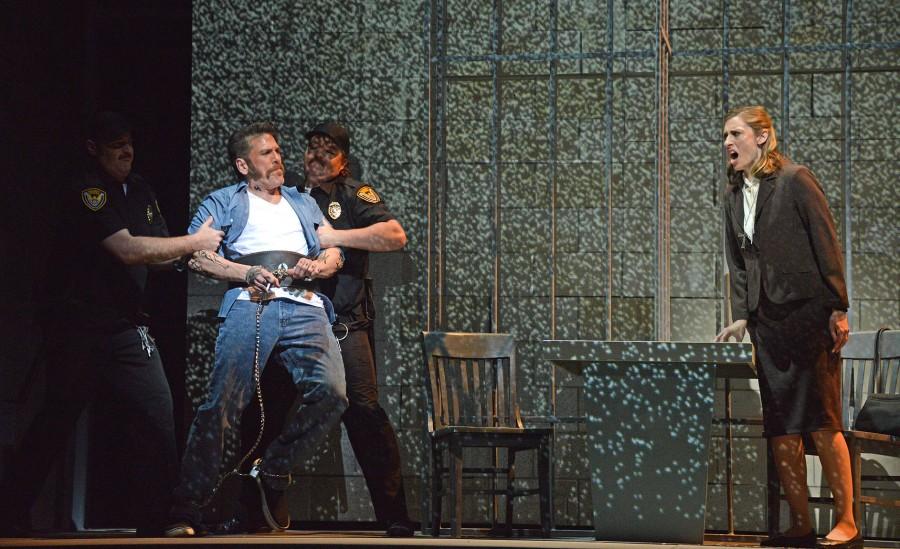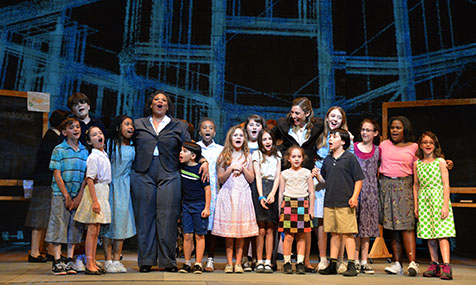Opus spotlights life and death in “Dead Man Walking”
March 4, 2016
Based on the book of the same name by Sister Helen Prejean, a Roman Catholic nun and death row spiritual adviser, the opera spotlights her connection with a fictional death row inmate named Joseph De Rocher.
The opus, which takes place at the Louisiana State Penitentiary during the 1980s, is being presented by The New Orleans Opera Association at the Mahalia Jackson Theater for the Performing Arts on March 4 and 6.
Nancy Watts, director of audience development for the New Orleans Opera Association, said the show holds a very strong connection with Loyola University.
“Several current students and alums are in the adult chorus. Some of them are doing bit roles, while others are contributing students to the kid chorus,” Watts said. “Alum Casey Candebat has a comprimario role, and voice faculty member Tyler Smith and staffer Ken Weber are doing roles, too.”
Ken Weber, resident minister for Liturgy and Music at Loyola, who dons the role of prison ward George Benton, said that the opera performance offers a personal dynamic that cannot be achieved through reading or film.
“Each artistic medium has a way of reaching us on different levels,” Weber said. “When you hear the prisoner singing about his own impending execution in a very dramatic musical language, it affects us in a deeper or different place than just reading about it.”
Composer Jake Heggie said that he and Terrence McNally, who wrote the libretto, were very interested in the emotion the story emanates because it felt like a contemporary American story that is both universal and timeless.
“We decided we wanted to write an opera that draws people into the story but doesn’t tell them how they should feel, that doesn’t tell them what their opinion should be,” Heggie said. “It just brings all sides to the story so we can have a dialogue about it, and that’s what the arts can do.”
Heggie said that a powerful stage performance can communicate in a way that other mediums cannot.
“To see three-dimensional people on the stage going through these things and with emotions so big that you have to sing about it – that’s terribly engaging and moving.” Heggie said.
Coming off of his trip from the Louisiana State Penitentiary, Weber reflected on the show’s message.
“What I hope people take away from the show is a reminder that everyone is human and, just as Sister Helen said, deserves compassion and respect,” Weber said. “We all make mistakes. Some of us make terrible mistakes with terrible consequences, but a human life is a human life and that’s important to remember.”
Weber said that the show is welcoming to those new to the theatre and seasoned audience members alike.
“It is a great first opera to see because it’s a timeless subject, and it is both easy to understand the singing and the acting,” Weber said.
Heggie said he believes the death row opus, which has performed on more than 50 different stages throughout five different continents, has an important narrative to share with the public. He said he hopes the act is able to evoke emotions in each audience member.
“I think we create art for people to feel changed, somehow, and that’s not to say that I’m trying to change anyone’s mind,” Heggie said. “I just want people to feel that the experience of the music, the drama and the performances, will stay with them and will leave a mark on their hearts.”
Heggie believes the show has something for everyone in it because it challenges each individuals imagination so that everyone might look at the world in a different way.
“It is a very powerful story topic with a wide range of music that is influenced by rock, pop, jazz, blues and operatic tradition,” Heggie said. “It is also part of our cultural dialogue, so to be engaged as a student in that cultural and social dialogue is incredibly important.”









